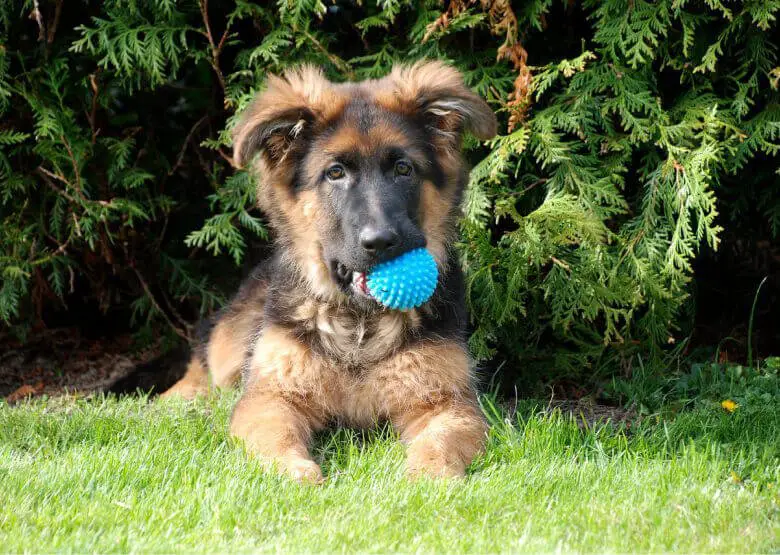Table of Contents
No field day compares to that wonderful time when you go to buy a dog! Of course, you have already read a lot of books with advice on how to choose the right puppy of a German Shepherd, east European, as well as a Newfoundland, Rottweiler, Spaniel, or Spitz puppy.
You understand what is the fundamental difference between these breeds and why a Retriever puppy will never become a VIP bodyguard, and a black terrier will hardly ever pass for a draft husky.
Why Opting For a German Shepherd Puppy Is a Good Choice
The German Shepherd is prone to learning from a very young to deep old age, while many other breeds cannot boast of this, even if their appearance is more perfect than that of a German Shepherd.
The most well-known characteristics that a German Shepherd owns are:
- pronounced protective and guarding instinct;
- the ability to make independent decisions, and active actions, and at the same time be completely submissive to the owner;
- sociability, playfulness, and curiosity;
- lack of aggression signs towards others and deep affection for the owner;
- a willingness to happily take on tasks, learn, and remain completely fearless when faced with unfamiliar surroundings or unforeseen difficulties;
In addition, the Shepherd dog is calmly confident and features strong nerves, combativeness, and assertiveness which are the main qualities of a good service dog.
Perhaps, due to this set of breed characteristics, few larger and more ferocious breeds can compete with a GS, both for guarding the house and as a personal protector.
Does It Matter at What Age to Get a German Shepherd Puppy?

It is not recommended to take puppies under 4 weeks old from their mother. This applies not only to GSs but other breeds.
At the age of one month, the baby has already been given all the necessary vaccinations. It can eat on its own, and is in the so-called ‘stage of formation’, which allows it to easily adapt to new living conditions.
However, only a person who can devote a lot of time to raising a puppy can afford to take a Shepherd at such a young age. In addition to 6 meals a day, and socialization, the new owner will need to complete 1,000 different tasks, which require, above all, a lot of time.
If there is no time, it is worth finding a puppy aged 4 to 6 months. And it is advisable to take such a teenager from a nursery that focuses on breeding German Shepherds and not all the breeds at once.
It’s a fact that German Shepherd puppy breeders often ‘retain’ puppies with good characteristics until it is finally clear who will grow out of a ‘round cub’. It happens that a puppy stays in the nursery because the money deposit was given for it but, for some reason, people could not pick up the reserved puppy.
If the grown-up German Shepherd puppy constantly lived in an aviary and was deprived of close contact with people and the outside world, owners who have not previously dealt with this breed should not choose such a youngster. These young dogs are for experienced cinologysts. Lack of socialization can be corrected but it cannot be fully eliminated.
A conscientious breeder will point out to you the advantages or disadvantages of all puppies from the litter, help you choose the desired type of character, and give advice on feeding and raising your ‘precious acquisition’. And there is one more thing – a conscientious breeder is ‘always in touch’ with the new owner of the puppy.
Testing for the Puppy and Its Future Owner

You may already know how to choose a purebred German Shepherd by external signs under the age of 3 months.
Simple tests will help you choose a puppy with the desired character.
Visit the breeder at a predetermined time when the puppies do not sleep or, conversely, are not hungry.
Do not get excited at the sight of a bunch of fat-footed ‘cubs’ looking at you with gray-blue eyes! You are taking a future friend for life, and enthusiastic emotions with such a choice are inappropriate. When buying a new friend, inspect the litter meticulously.
Pay attention to the following:
- eyes do not water;
- traces of diarrhea under the tails are not observed;
- wet noses are without purulent crusts;
- legs are straight and strong;
- fur is clean, reminding of the plush;
- on the skin under the coat, there are no signs of peeling and scabs;
- all puppies are active and well-fed;
- the body is elastic and strong to the touch;
- the puppy has a pleasant dog smell;
- the mother is not exhausted;
- bowls and bedding are clean;
- there is enough heat and light.
Clap your hands to get the puppies’ attention. (Of course, the owner of the dog mother has already taken her to the next room). Those who paid attention to the unusual sound are yours.
Throw (carefully, of course) a tennis ball at the puppies. Those who were not afraid and did not try to escape are yours.
Select ‘your’ puppies and take them 1.5-2 meters from the nest. Those who, having scouted the situation, did not begin to whine, pressing themselves onto the floor, but hurried towards the bedding are yours.
Throw ‘your’ puppy a squeaky rubber toy from above. Pay attention to those who have shown interest in a new object. The best are those who took and dragged it.
Don’t throw a bunch of keys to puppies! Keys and money are the dirtiest household items. This testing method was used 20 years ago. Today, it is dangerous for the health of puppies!
Invite those who dragged the rubber duck to pull a piece of fabric. If the baby dog willingly starts the fight, not letting the cloth go when you pull it towards you, they are good boys or girls.
Turn the puppy you like on its back and hold it with an open palm for a few seconds. A clear alpha leader is easy to identify by its non-calming behavior for 15-20 seconds, and even trying to bite you in this position. It may not be your choice! You will get too many problems associated with the puppy, or it will never be possible to completely subdue it.
Extend the puppy’s paw and lightly pinch it between fingers. The puppy that squealed, pulled back its paw, and did not lose its interest in you is yours.
With permission from the mommy’s owner, offer puppies left after the tests food from the same bowl. The one who barks trying to drive brothers and sisters away from the bowl is not for you. The one who gives up its place at the feeder is also not yours. Yours is the one who, regardless of the obstacles, has taken its place and calmly devours food, without moving from its point, snapping, and running around the bowl.
Now, you have (at best) 2 or 3 puppies left in front of you. Put them in a bag and close the zipper, leaving only a small ‘window’. You need to select the fat-footed one who will try to get out through the opening without panic and squealing.
The tests are simple, but they will allow you to select a good puppy and raise a real working German Shepherd from it without unnecessary costs and nerves.
Don’t be tempted with titles in the pedigree! Talk to the breeder. The ‘blockhead’ you have chosen may have some remarks on the exterior after being certified by the head of the breed club. Such puppies are sold at a more reasonable price, but the puppy card for them is mandatory to be filled out as well.
If you are given puppies for free, in the absence of their mother, there is a reason to seriously consider whether it is a Shepherd dog at all, even if their mother has pedigree documents.
Can I Adopt an Adult German Shepherd? – It is a Serious Question
The answer is ‘you can’! Current myths about the poor survival/adaptation of an adult German Shepherd dog in a new family are propagated by bad owners of a poorly managed dog. They didn’t bother to find out everything about the reputation of that Shepherd dog and its previous owner before acquiring it.
The German Shepherd wouldn’t earn the status of an excellent working police dog if it was only one-person oriented. This is not a dog of one owner!
The versatility and flexibility of this breed are proven by the fact that GSs accept a new family and a new environment without any problems. The main thing for it is to have its own business – to serve a human!
Of course, parting with the former owner seriously affects the condition of the dog, but it will not have a destructive effect on its psyche. And the sooner you engage the German Shepherd in work, the more chances you will have to become a new God for it.
If the German Shepherd was properly brought up and grew up surrounded by people, it has working characteristics in good conditions, and the reputation of its previous owner is beyond all questions, such a dog will be quite useful to your family.
Finding out the previous story and background of an adult GS (why it is refused, what the complaints about its behavior are, and other prompting questions) is a must! The reason may be the saddest and most trivial – the previous owner died, and relatives are not able to either support or care for the dog.
